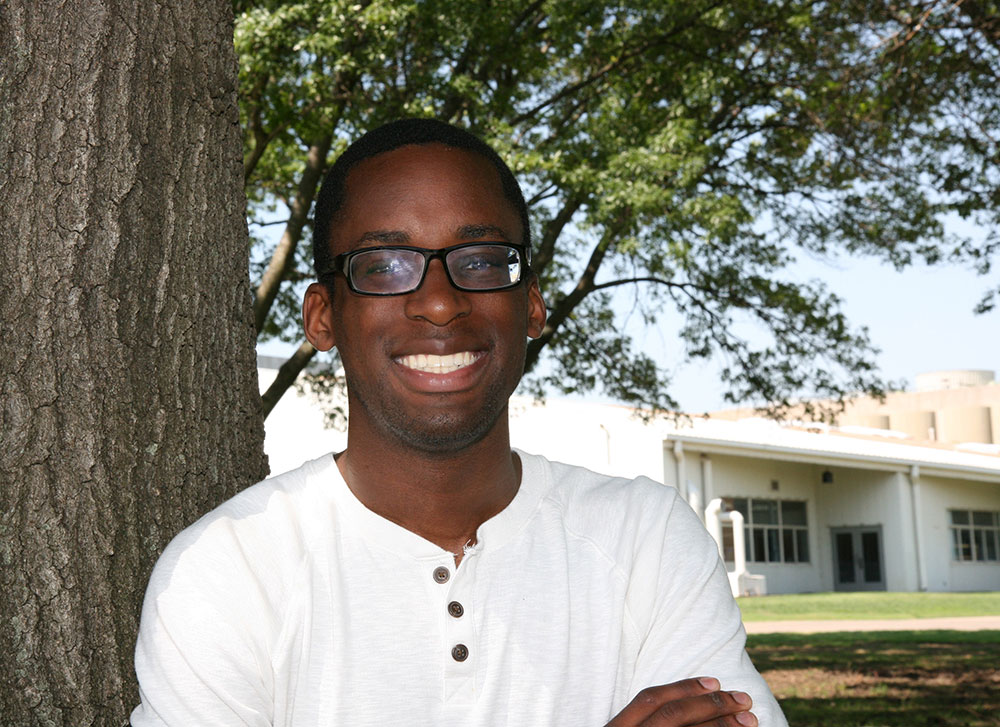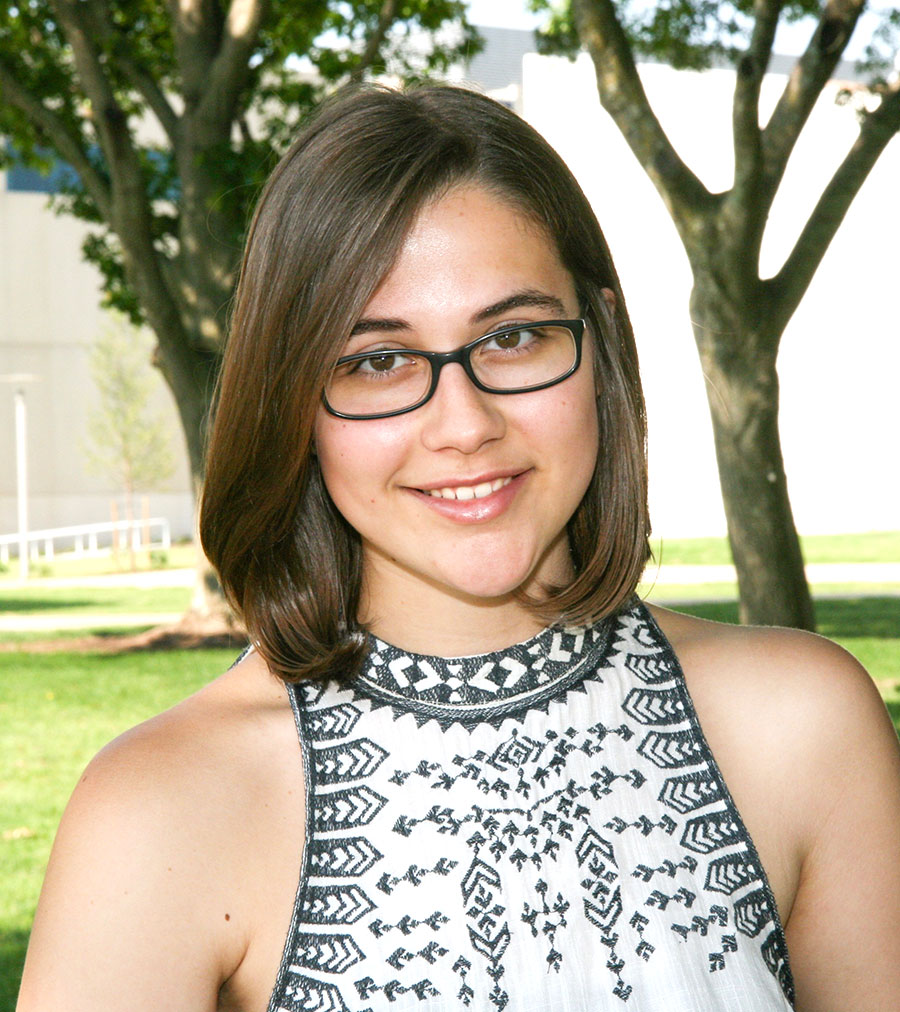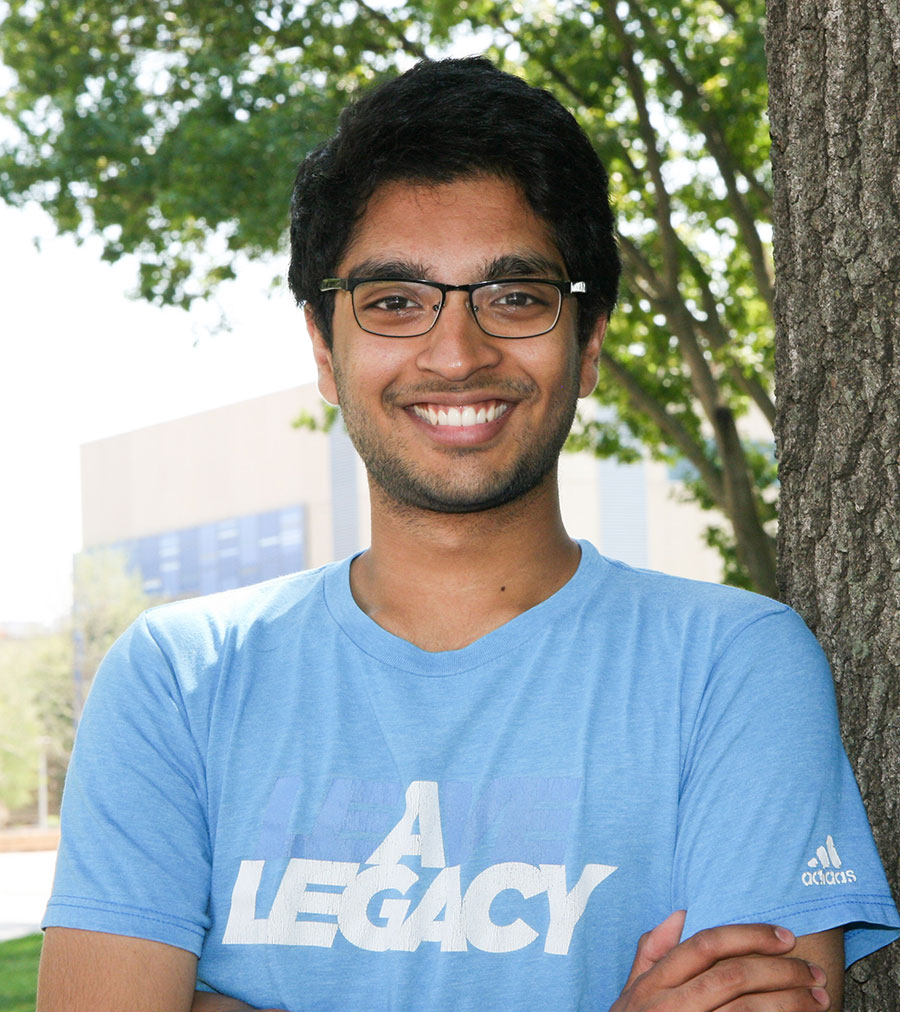
Hans Ajieren, who will be an electrical engineering junior this fall, has received a full scholarship from the Barry M. Goldwater Scholarship and Excellence in Education Program.
When Hans Ajieren began working in a materials science lab as a freshman at UT Dallas, he was placed on a team working to develop a new cochlear implant made from shape memory polymer, a material that changes its mechanical properties in response to changes in temperature.
“We are designing an implant that can recover into the shape of the cochlea once it heats up to body temperature. I was sold on the idea the moment I heard about it,” Ajieren said.
His efforts now have garnered national recognition. Ajieren, who will be an electrical engineering junior this fall in the Erik Jonsson School of Engineering and Computer Science and is a McDermott Scholar, has received a full scholarship from the Barry M. Goldwater Scholarship and Excellence in Education Program.
Honorable mentions went to three other UT Dallas students: Muhammad Akram, a mechanical engineering senior; Sheridan Cavalier, a neuroscience senior in the School of Behavioral and Brain Sciences; and Karthik Hullahalli, a biology junior in the School of Natural Sciences and Mathematics.
This is the first time that all four UT Dallas nominees were recognized. Because universities can nominate only four students a year, the selection is “very vigorous,” said Dr. Douglas Dow, associate dean of the Honors College and clinical professor of political science.
“Beyond the honorifics for the individual scholars, our showing in the Goldwater competition highlights the University’s institutional maturity in being able to give such a deep field of outstanding undergraduates,” Dow said.
Ajieren, a graduate of the Texas Academy of Mathematics and Science, was tasked in the Advanced Polymer Research Lab of Dr. Walter Voit, assistant professor of materials science and engineering, with developing an electronic device to insert the shape memory polymer cochlear implants. He has completed the device and is fine-tuning its thermal and mechanical controls. This summer, Ajieren will research implantable devices in a biomedical engineering lab at Purdue University.

Sheridan Cavalier
Voit said Ajieren’s personality and technical competence make him an excellent role model who inspires other students.
“Hans is a bright, dynamic innovator, thinker and scholar. As an undergraduate researcher, Hans exceeds expectations and is the kind of problem solver and tinkerer that will be a future leader in his generation,” Voit said. “Hans helps foster the engaging, dynamic culture that makes research enterprises such as our Advanced Polymer Research Lab fun, yet challenging, places to be creative and tackle problems with a technical mindset.”
Eventually, Ajieren plans to earn a PhD in electrical engineering and continue researching innovative devices for the medical field, focusing his work on wireless signaling and power management.
“Academia is the place for cutting-edge research, for those big dreams we’re not sure will even pan out yet,” Ajieren said. “Electrical engineering offers solutions to a number of nervous system disorders. I see bioelectronics research as the most rewarding place to take my degree right now.”

Karthik Hullahalli
Honorable mention recipients also have done undergraduate research at UT Dallas.
Akram has worked in the labs of two assistant professors of mechanical engineering: researching biomechanics with Dr. Majid Minary and robotics with Dr. Yonas Tadesee. Last summer, he studied how to optimize silicon chips for maximum energy at Stanford University.
Akram has a personal reason for wanting to research how to develop neuro-interfacing devices that can help regenerate nerves. Since birth, Akram has had Bell’s palsy, which has left half his face paralyzed.
“My brother has Bell’s palsy as well, but to a lesser extent. I wanted to come to UT Dallas to figure it out,” Akram said.
He plans to pursue a graduate degree and continue working with different materials to develop implantable biomedical devices.
Cavalier has been an undergraduate researcher since her freshman year at UT Dallas in Dr. Christa McIntyre’s Neurobiology of Memory Lab, studying cellular mechanisms of learning and memory in autistic models in animals. She said the experience researching neurodevelopmental disorders has entirely changed her career path.
“I thought I was heading for a career as an M.D., but I fell in love with research, especially in cellular and molecular science. It’s a completely different environment, with a real spirit of science and collaboration. You’re expected to produce good questions, not just give back rote answers.”
Cavalier, who did a high school internship at UT Southwestern Medical Center through the Science Teacher Access to Resources at Southwestern (STARS) program, plans to earn her PhD and teach at a research university someday.
This summer, she will research Fragile X Syndrome in the lab of Dr. Kimberly Huber as part of the Summer Undergraduate Research Fellowship Program at UT Southwestern’s Graduate School of Biomedical Sciences.
“That’s where I want to go to grad school, so hopefully this will get my foot in the door,” Cavalier said.
Since his senior year of high school, Hullahalli has done research on antibiotic resistance in pathogenic bacteria in the lab of Dr. Kelli Palmer, assistant professor of biological sciences at UT Dallas.
“We are finding ways to prevent bacteria from exchanging DNA with one another,” Hullahalli said. “It’s cool in the sense that you’re studying some very, very specific thing that people might see no use for yet, but you are able to follow it through to the end result. Some people don’t like the slow process, but I love it.”
Hullahalli will spend the summer at the University of California, Berkeley, as an undergraduate researcher in the Amgen Scholars Program. He plans to eventually earn his PhD and continue to do research as well as teach on the university level.